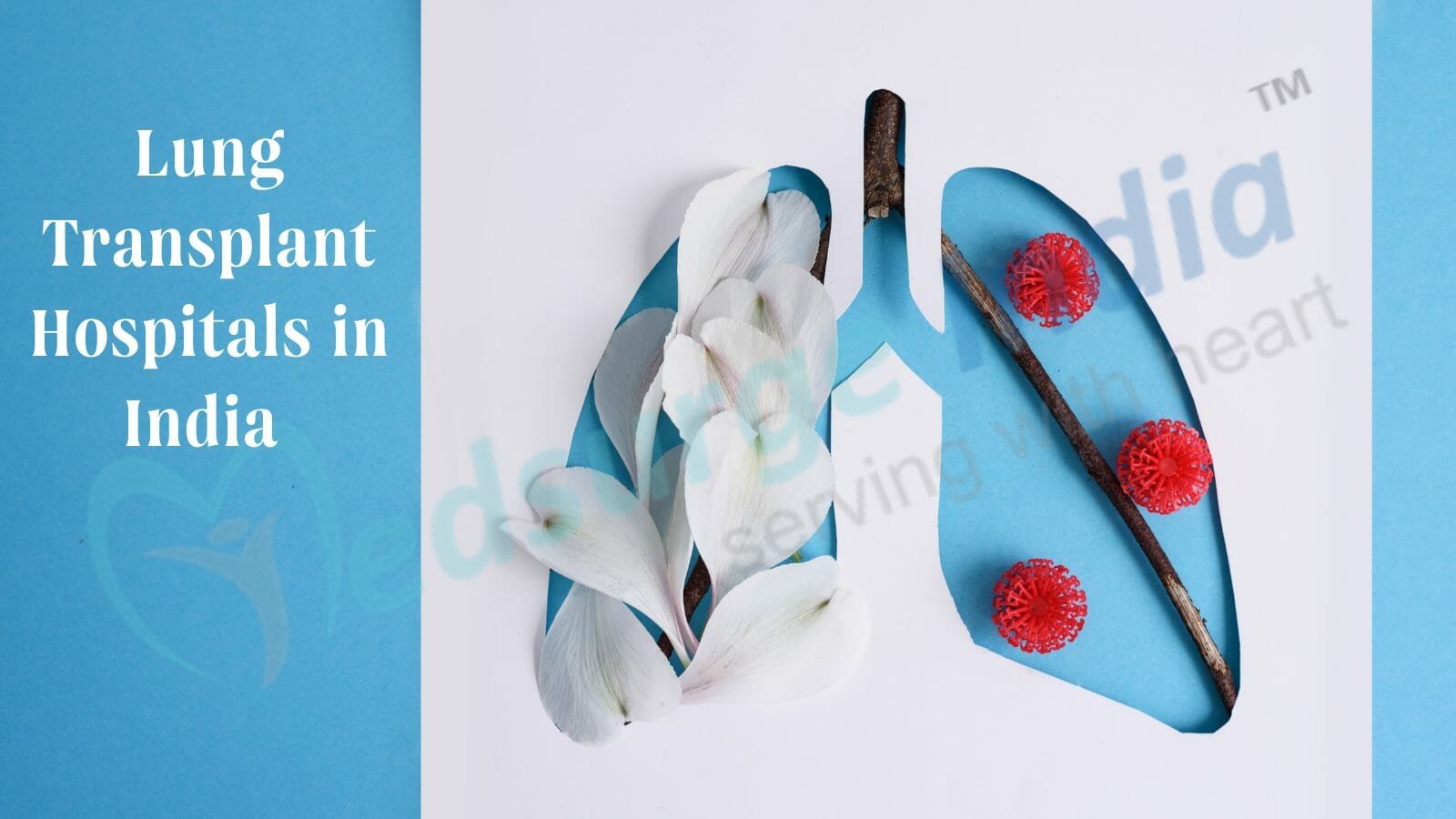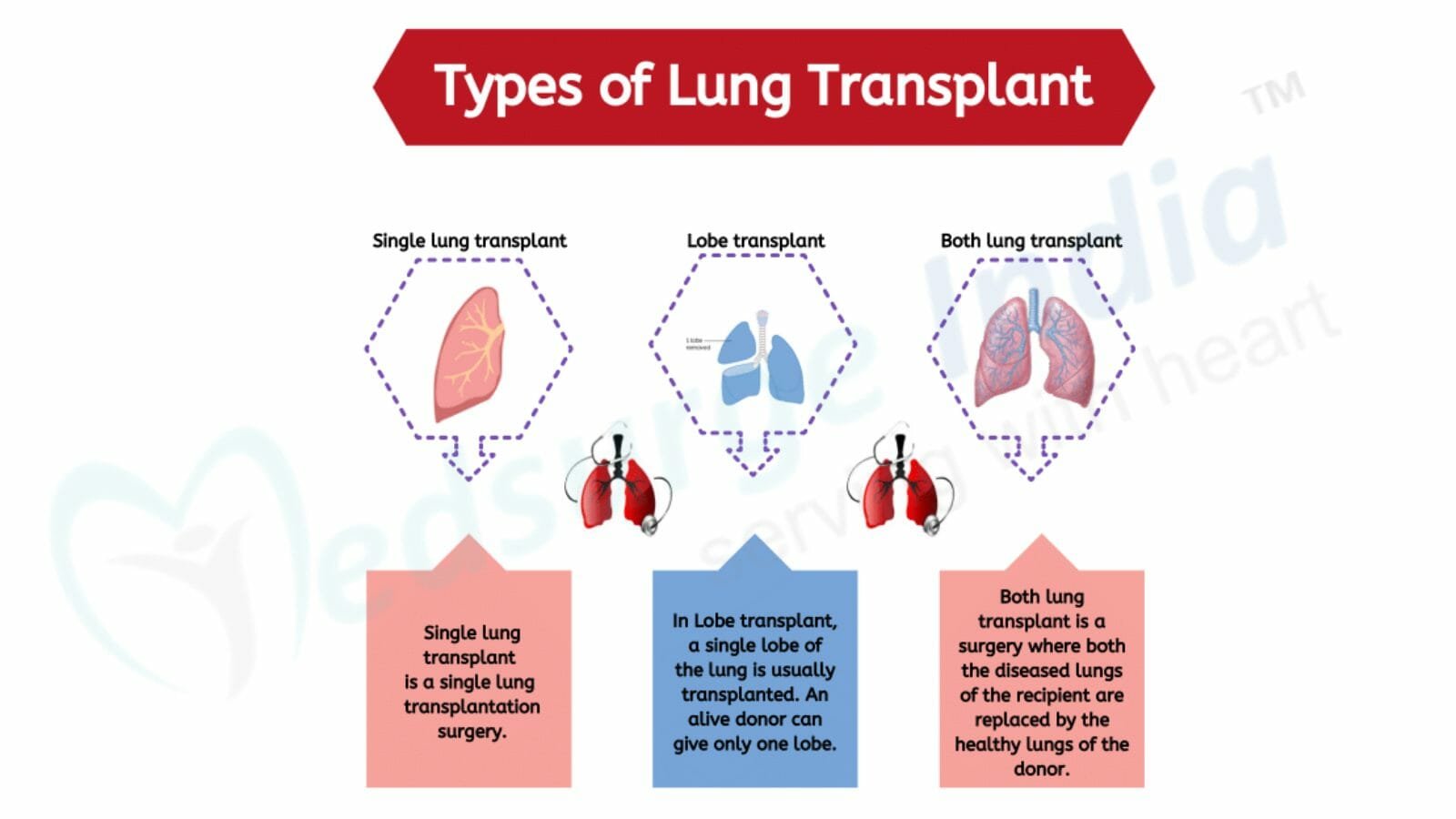
What Do You Mean by the Term “ Lung Transplant”?
A lung transplant is a surgery that replaces a diseased or failing lung with a healthy lung from a deceased donor. A lung transplant is intended for those who have tried other medications or treatments but haven’t seen enough improvement in their condition.
A lung transplant may include replacing one or both of your lungs, depending on your medical condition. The lungs may be transplanted alongside a donor’s heart in some cases. Lung Transplant in India is highly accessible and preferable.
Why are Lungs important?
The respiratory system, which consists of a collection of organs and tissues that work together to help you breathe, includes your lungs. The fundamental function of the respiratory system is to bring fresh air into your body while eliminating waste gases.
Every cell in your body requires oxygen to survive. Oxygen and other gases are found in the air we breathe. When oxygen reaches the lungs, it is transported to the bloodstream and carried throughout the body.
Oxygen is exchanged for a waste gas called carbon dioxide at each cell in your body. This waste gas is subsequently carried back to the lungs, where it is taken from the bloodstream and expelled.
Gas exchange is a vital function that your lungs and respiratory system undertake automatically.
Types of Lung Transplants
 The majority of transplanted lungs come from dead organ donors. A cadaveric transplant is a name for this kind of transplant. Adults who are healthy, nonsmokers, and a good match may be able to donate a portion of one of their lungs. A lobe is a section of the lungs. A live transplant is a name given to this sort of transplant. Donors of a lung lobe can live a normal life with their remaining lungs. The various available type of Lung Transplant in India are following:
The majority of transplanted lungs come from dead organ donors. A cadaveric transplant is a name for this kind of transplant. Adults who are healthy, nonsmokers, and a good match may be able to donate a portion of one of their lungs. A lobe is a section of the lungs. A live transplant is a name given to this sort of transplant. Donors of a lung lobe can live a normal life with their remaining lungs. The various available type of Lung Transplant in India are following:
- Single Lung Transplant
- Double Lung Transplant
- Bilateral Sequential Transplant
- Heart-Lung Transplant
Who May Need a Lung Transplant?
A lung transplant is an option for most people with severe, end-stage lung disease. When someone appears to be dying without surgery and no other options are available, the procedure should be explored. People whose lung disease has progressed to the point that they can no longer enjoy life may benefit from a lung transplant.
The following conditions may cause enough damage to your lungs to necessitate a transplant:
- COPD stands for chronic obstructive pulmonary disease (COPD)
- Cystic fibrosis is a disease that affects the lungs.
- Emphysema
- Pulmonary fibrosis is a disease that affects the lungs.
- Hypertension of the lungs
- Sarcoidosis
Helpful – What Are The Effects Of Lung Cancer On The Body?
How it May Done?
Before Lung Transplant in India, A full physical exam, meetings with members of the Lung Transplant Medical Team, and a series of tests are all part of the pre-transplant examination. A pre-transplant evaluation gathers detailed information about your overall health and assists in determining whether you are a candidate for a lung transplant.
The search for a donor will begin once your medical professional has concluded that you are a good candidate for a lung transplant. It takes time to find a suitable donor, and the waiting period can be stressful.
For Lung Transplant Hospital in India, Things proceed directly after a donor is confirmed. You’ll be admitted to the hospital right away, have surgery, and stay for 2 to 3 weeks or longer, depending on your rehabilitation.
You will learn about your new medications, how to spot indicators of problems, and when you can resume your typical activities during your recovery. You should expect to heal gradually once you return home, usually over 3 to 6 months.
Following your transplant, you’ll have regular consultations with your doctor and tests to see how well your new lung is performing and how well your medication is functioning.
What is the Scenario of Lung Transplant in India?
The best Lung Transplant Hospital in India programme are listed below. These hospitals, are staffed with the best transplant surgeons and technological expertise, has pioneered a number of complex and creative transplant surgeries with a high success rate.
Best Liver Transplant Hospitals in India
Gleneagles Global Hospital, Chennai:
- The top lung transplant hospital in India, Chennai based Gleneagles Global Hospitals, provides the best lung transplant surgery, lung treatment, and care for all types of pulmonary disorders and lung failure cases.
- The hospital is now known as one of India’s leading lung transplant facilities, with the best lung doctors on staff. The hospital has performed the best lung transplant surgery at the most affordable lung transplant costs.
- We have grown into one of India’s top lung transplant hospitals by collaborating with the greatest lung transplant specialists in India, who bring a wealth of experience and broad expertise.
Fortis Hospital, Gurgaon:
- Gurgaon’s Fortis Memorial Research Institute is one of the best hospitals for transplantation purposes. FMRI’s liver transplant facility offers a full range of services, from pre-surgical planning to post-operative care.
- It allows patients to receive multiple organ transplants, such as a liver-kidney transplant or a liver-lung transplant, if necessary.
- More than 2500 liver transplants have been performed at the hospital, with a success rate of 95 to 100 percent.
- They had performed over 500 independent liver transplants, with the lowest risk of biliary complications.
Indraprastha Apollo Hospital, Delhi:
- In 1998, the Indraprastha Apollo Hospital was the first in India to do a liver transplant.
- The hospital has cutting-edge technology, including a 320 CT scanner, state-of-the-art liver ICUs, and surgical rooms.
- It has been reported that it can do approximately 500 liver transplants in a short period of time with a success rate of over 90%.
- Not only that, but in 2008, Apollo Hospital performed the world’s youngest liver transplant.
- Aside from doctors, the medical team includes pre-and post-transplant nurses, dieticians, and physiotherapists to provide total care till the patients are fully recovered.
MGM Healthcare, Chennai:
- In Chennai, the Mahatma Gandhi Memorial Healthcare is a 400-bed super speciality hospital.
- The hospital features a long list of accomplishments, including being rated third in the world for 102 heart transplants in a single year.
- In addition, Asia’s highest number of paediatric heart transplants, nearly 110.
- The expert team at MGM has done over 25000 heart surgeries.
- It is the first USGBC LEED Platinum certified green hospital in India.
MIOT Hospital, Chennai:
- The MIOT International Hospital, also known as the Madras Institute of Orthopaedics and Traumatology, is a multi-speciality hospital in Manapakkam, Chennai, India.
- It is India’s first hospital to have a 750-definition CT scan with dual-energy imaging.
- It began as an orthopaedics centre but has now expanded to include neurosurgery, cardiology, thoracic and cardiovascular care, nephrology, oncology, knee and hip replacement surgery, plastic surgery, paediatrics, obstetrics, craniofacial and cosmetic surgery, and more.
- The first T- Replete Haplo Identical Bone Marrow Transplant in India was conducted in 2013 at MIOT Institute of Hematology, Hemato-Oncology, and BMT.
KIMS Hospital, Hyderabad
- The members of the KIMS Lung Transplant Center’s team are transplantation experts. Members speak at conferences all around the world, serve on transplant policy committees, and are nationally recognised for their contributions to clinical transplantation and research.
- Members with expertise in pulmonary medicine, thoracic surgery, anaesthesia, pathology, radiology, pharmacy, nursing, research coordination, social work, physical therapy, psychology, and other allied specialities make up the multidisciplinary team.
- KIMS Hospitals is a group of six separate institutes spread across six different locations, all of which are GreenOT, NABH, and NABL approved.
- This hospital features India’s third-largest epilepsy centre.
- The hospital offers advanced tertiary care in a variety of areas, including neurosciences, cardiac sciences, oncology, orthopaedics, renal sciences, and gastric sciences.
Conclusion
A lung transplant can improve your quality of life significantly. The first year after a transplant is the most essential, as it is during this time that surgical problems, rejection, and infection are most likely to happen.
Although some people have lived for ten years or longer after receiving a lung transplant, only approximately half of those who receive the procedure survive five years.



 (1).png)